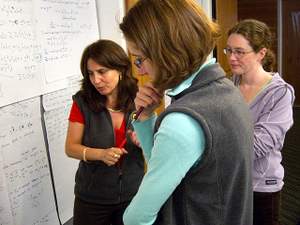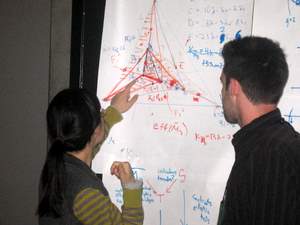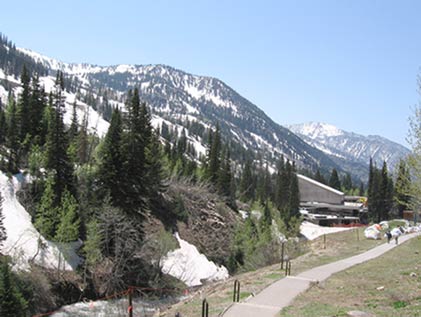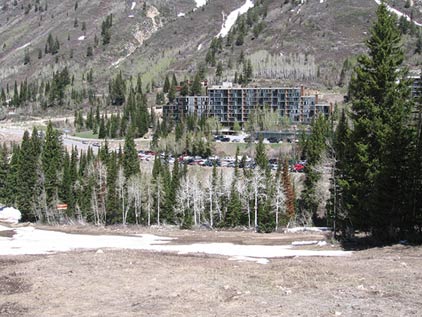Mathematics Research Communities - 2014
Note About 2015 MRC: We now have a full program for the 2015 MRC summer conferences. We encourage those interested in organizing an MRC conference to submit a proposal for the summer of 2016. Information and guidelines can be found in the Call for 2016 Proposals.
The American Mathematical Society (AMS) invites mathematicians just beginning their research careers—those who are close to finishing their doctorates or have recently finished— to become part of Mathematics Research Communities, a unique and successful program that builds social and collaborative networks to inspire and sustain each other in their work. Women and underrepresented minorities are especially encouraged to participate. The structured program engages and guides all participants as they start their careers.
"It was empowering and created a more lasting learning experience because participants created their own knowledge based on the well-organized background, building blocks, and current research ideas presented by the conference organizers. Great conference!" --- MRC 2011 participant
The program includes:
-
One-week summer conference for each topic (With the exception of week 3, participants arrive on Sunday and depart the following Saturday; sessions are held Monday through Friday. For week 3, participants arrive on Tuesday and depart the following Monday; sessions are held Wednesday through Sunday.)
-
Special Sessions at the national meeting
-
Discussion networks by research topic
-
Funding for additional collaborations
-
Longitudinal study of early career mathematicians
Those accepted into this program will receive support (full room and board at Snowbird and up to US$680 in air transportation) for the summer conference, and will be partially supported for their participation in the Joint Mathematics Meetings which follow in January 2015. The summer conferences of the MRC are held in the breathtaking mountain setting of the Snowbird Resort, Utah, where participants can enjoy the natural beauty and a collegial atmosphere. This program is supported by a grant from the National Science Foundation.
Week 1: June 8 – 14, 2014 - Cluster Algebras
Organizers:
Michael Gekhtman, University of Notre Dame
Mark Gross, University of California, San Diego
Gregg Musiker, University of Minnesota
David Speyer, University of Michigan
Gordana Todorov, Northeastern University
Cluster algebras provide a unifying algebraic and combinatorial framework for a wide variety of phenomena in settings as diverse as quiver representations, category theory, quantum groups, Teichmuller theory, Poisson geometry, tropical geometry, polyhedral combinatorics, statistical physics models, discrete integrable systems, mirror symmetry, and string theory. Due to the fact that cluster-like structures appear in so many areas of mathematics and physics, the field has exploded in recent years.
This workshop will focus on some of the hot conjectures, questions, and topics in this field, including a classification of varieties that support cluster structures, Fock and Goncharov's conjectures regarding tropical points on cluster varieties and constructions of atomic bases, combinatorial approaches to sign-coherence, canonical bases from mirror symmetry, connections between continuous categories and D-branes. Despite the deepness of these questions and conjectures, there is fertile opportunity for graduate students and postdocs to make progress as connections between these topics are just beginning to be forged. Participants will also be introduced to computational tools such as Java applets and Sage packages in an effort to find new patterns or to verify conjectures.
Week 2: June 15 – 21, 2014 - Algebraic and Geometric Methods in Applied Discrete Mathematics
Organizers:
Carina Curto, University of Nebraska-Lincoln
Jesus A. De Loera, University of California, Davis
Christine Heitsch, Georgia Institute of Technology
Michael Orrison, Harvey Mudd College
Francis Edward Su, Harvey Mudd College
This research community will introduce young mathematicians to research bridging ``pure'' mathematics and various applications amenable to the analysis of discrete models. Mathematicians trained in areas such as algebra, topology, geometry, and combinatorics are often unaware of the extent to which they are prepared to tackle open problems in fields such as biology, the social sciences, data analysis, and optimization. There is also significant benefit in attacking applied problems from a discrete perspective with algebraic, topological, geometric and/or combinatorial tools.
The participants of this MRC will be grouped into five teams, each focusing on a particular application. During an intense week at Snowbird, the teams will work on specific open problems selected by the organizers. Participants will be expected to do background reading in advance of the workshop and come ready to collaborate and build strong research ties. Although each team will focus on a different application, there are common themes and methods, and the weekly activities will facilitate interactions between groups. The five focus areas are:
(1) Combinatorial Topology in the Social Sciences,
(2) Representation Theory in Data Analysis,
(3) Combinatorics in Molecular Biology,
(4) Algebraic and Geometric approaches in Neuroscience,
(5) Algebraic and Geometric methods in Optimization.
This MRC will bring together participants with diverse backgrounds and strengths. We welcome the entire spectrum of applicants, from those who are familiar with the applications but wish to broaden their mathematical tools to young mathematicians trained in algebra, topology, geometry, or combinatorics who are interested in exploring applications.
Week 3a: June 24 – 30, 2014 - Mathematics of Quantum Phases of Matter and Quantum Information
Organizers:
Siu-Hung Ng, Iowa State University and Louisiana State University
Eric C. Rowell, Texas A&M University
Zhenghan Wang, Microsoft Station Q and U.C. Santa Barbara
Our long term scientific goal is to study quantum phases of matter and their applications to physics and quantum computing. A general theory formulated by Landau classifies classical phases of matter by their symmetry groups. More mysterious and challenging to understand are quantum phases of matter. The most well-studied class of quantum phases of matter is topological phases of matter (TPMs), whose low energy physics and universal properties can be modeled well by TQFTs and their variations. The algebraic models of elementary excitations of TPMs are unitary modular categories (UMCs). If a classical symmetry modeled by a group G is also present (e.g. topological insulators), then the UMC is G-graded. The prospect of utilizing TPMs to build a quantum computer has been greatly enhanced by recent experimental progress.
Our workshop will focus on UMCs and their variations. We will introduce the participants to three broad areas of research in the subject via small collaborative projects. The first area is the refined classification of fusion categories with structures, especially modular categories. A recent breakthrough is a proof of the rank-finiteness conjecture that there are only finitely many equivalence classes of UMCs with the same rank. Interesting extensions will be to the premodular case and G-equivariant modular categories, which lead to 3D TPMs via lattice models by Walker and Wang and models for 2D symmetry enriched TPMs, respectively. A second area centers around the Property F conjecture for UMCs: all associated braid group representation images are finite if and only if D2 is an integer. The extended property F conjecture relates finite braid group image, integrality of D2, localizability, and polynomial-time computational complexity of knot invariants. The third area is 3D TPMs and (3+1)-TQFTs. Two obvious directions are the afforded representations of the mapping class groups of extended objects such as loops, and the resulting higher categories.
The lingua franca of the workshop will be that of fusion categories, and the program will appeal to students and posdocs from several diverse fields of study, including Hopf Algebras, Subfactors, Quantum Algebra/Topology, and Category Theory. In addition we hope that some mathematically sophisticated physics and computer science students and postdocs will participate.
Week 3b: June 24-30, 2014 - Network Science
Organizers:
Aaron Clauset, University of Colorado, Boulder
David Kempe, University of Southern California
Mason A. Porter, University of Oxford
Over the last decade, the quantitative study of networks has emerged as a fundamental tool for understanding and modeling complex systems of all kinds. Although it has built on prior foundational work in areas such as sociology, mathematics, and computer science, the increasing availability of detailed data sets has led to insights into --- and ambitions for attaining a much deeper understanding of --- the structure, dynamics, and function of social, biological, physical, and technological systems.
A fundamental challenge in network science is to extract a solid foundation and a set of key principles for networked systems from the widely dispersed efforts in analyzing real-world networks and developing mathematical models of networks. Progress requires thorough investigations in many key areas, including (i) characterizing the complex and often multi-scale structural patterns of real networks, (ii) understanding the way network structures constrain or drive dynamical processes that operate on top of this structure (e.g., communication or epidemic processes), (iii) developing rigorous methods for fitting static and dynamic network models to data and for testing network hypotheses, (iv) identifying and detecting fundamental modes of organization in networks as well as the underlying processes that produce these structures, and many others.
This MRC aims to introduce young mathematical and computational scientists to modern research in network science. It will explore some of the key techniques, develop in-depth knowledge of several overlapping topic areas, and engage in research to attack open problems.
Application Procedure
Individuals within one to two years prior to the receipt of their PhDs, or within one to three years after receipt of their PhDs are welcome to apply. The MRC program is open to individuals who are U.S. citizens as well as to those who are affiliated with U.S. institutions. A few international participants may be accepted. An exception to the limit on the mathematical age of an applicant may be made on a case-by-case basis. Women and underrepresented minorities are especially encouraged to apply.
All participants are expected to be active in the full MRC program. Please note that there is a generic cover sheet to submit. However, submitting this cover sheet does not constitute an application. You must answer an additional set of questions and submit this as well. In addition to the completed application form (cover sheet and additional questions), you must submit a letter of reference from a mathematician who can discuss how you will benefit and how you will contribute by participating in the MRC program. Instructions are as follows:
-
Login to MathPrograms.Org as a Program applicant (click on “as Program applicant”).
-
To create an account, fill in your email address, create a password, click the button “this is my first login, please create an account for me”, then click the “login” button. A login token will be sent to the email address provided. Please check your email.
-
Once you have received the token, enter it in the text box on the screen, or come back to www.mathprograms.org within 24 hours and click on the applicant login link to continue.
-
Once you are logged in, fill in the cover sheet and submit it. Name your reference writer and make sure the email button is on so the writer will receive automatic notification.
-
Click on “View Programs” and then click on “apply” next to the program you want and complete the questions.
-
Follow the directions from there.
You can log in to the MathPrograms system at a later date to update your application and/or to verify that the reference letter has been submitted. The application is complete when all questions have been answered and the reference letter has been received. Deadline for receipt of applications is March 1, 2014.
Top of Page
Snowbird
Situated in a beautiful, breathtaking mountain setting, Snowbird Resort provides an extraordinary environment for the MRC. The atmosphere is comparable to the collegial gatherings at Oberwolfach and other conferences that combine peaceful natural ambience with stimulating meetings. MRC participants have access to a range of activities such as a tram ride to the top of the mountain, guided hikes, swimming, mountain bike tours, rock climbing, plus heated outdoor pools. More than a dozen walking and hiking trails head deep in the surrounding mountains. Participants also enjoy the simpler pleasures of convening on the patios at the resort to read, work, and socialize. In the evenings colleagues enjoy informal gatherings to network and continue discussion of the day's sessions over refreshments. Within a half hour of the University of Utah, Snowbird is easily accessible from the Salt Lake City International Airport. For more information about Snowbird Resort, see www.snowbird.com.
For further information, please contact
Ellen J. Maycock at
ejm@ams.org.
Top of Page






